Happy New Year to you all!
Each year we have a holy hour and a Mass on New Year’s Eve as a way of ending the old year and beginning the new. It is a custom that I have observed every year since I was ordained a priest. In fact, when I was in the West Indies, it was the biggest celebration of the year — people could not fit into the churches; many were outside looking in the windows.
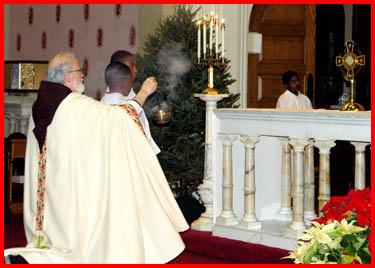
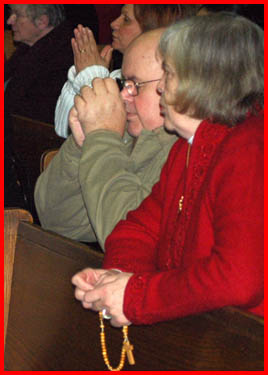
When I came to Boston I was very pleased to see that the tradition was already in place here. Of course, I have been pleased to be able to continue it.
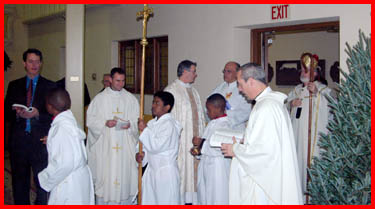
Beginning the Mass
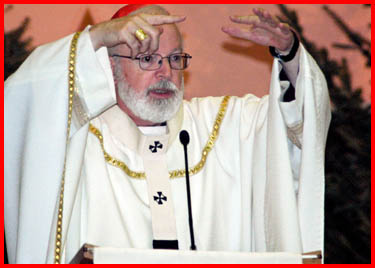
Delivering the homily
The Pro-life and Young Adult Offices have been key sponsors of this Mass and the holy hour often has a pro-life theme. This year the theme was centered around the vocation of marriage as part of the marriage initiative currently underway in the four dioceses of Massachusetts. It was our pleasure to hear two testimonies on the vocation of marriage.
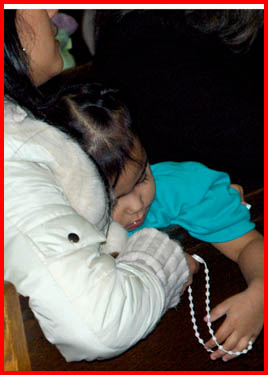
It seems to have been a late night for some of the little ones
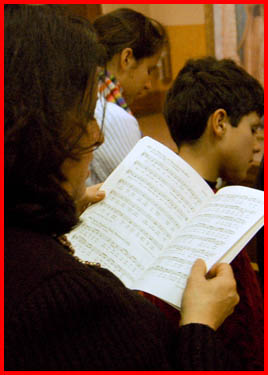
Marianne Luthin, director of the Pro-life Office, as awlays, worked very hard to prepare the event, which was held at St. Mary Parish in Waltham. We are also very grateful to Father Michael Nolan and his parishioners for hosting the Mass. After the Mass, they served coffee, cookies and things, and people had the chance to socialize.
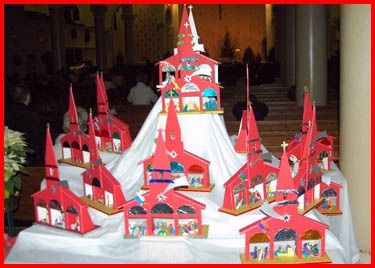
The church was decorated with these manger scenes created by the parish children set in small models of St. Mary’s
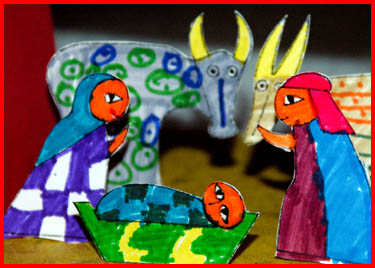
There was wonderful participation; the church was filled. Those in attendance were a wonderful reflection of the diversity of our archdiocese. There were African, Syro-Malabar and Hispanic Catholics. The congregation was young and old. I was also pleased to see many of the seminarians were there.
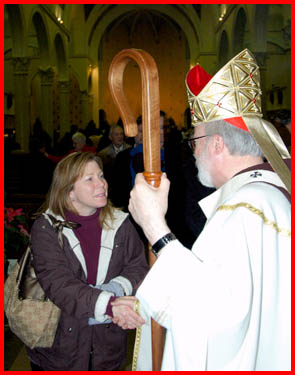
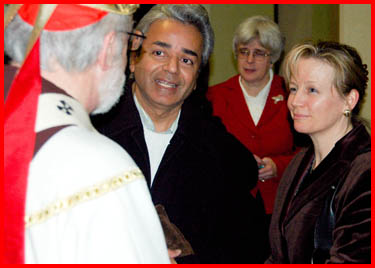
– – –
Another tradition I have maintained since arriving in Boston is celebrating a Mass on New Year’s Day with the Haitian community. Jan. 1 is their Independence Day, and the Mass is an opportunity for them to gather with their bishop at the cathedral. The Mass was celebrated in Creole and French, the languages of the Haitian people.
The Mass has always been a very beautiful celebration and as usual, the choirs were wonderful.
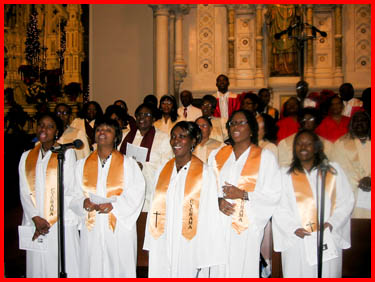
Father Gabriel Michel is the coordinator for the Haitian priests, and there were many priests, seminarians, religious who came. The cathedral was quite full.
One of the beautiful customs of the Haitian people is eating pumpkin soup as a sign of their liberation on New Year’s Day.
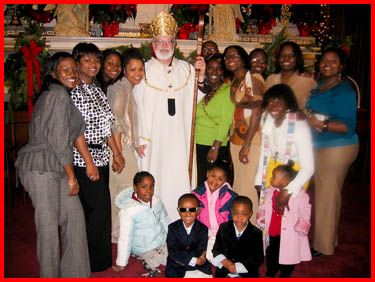
The Haitian community is a very important part of our Catholic community in our archdiocese, and their Haitian Catholic Center is doing very well.
– – –
On Thursday I celebrated a Mass with the residents of Regina Cleri, the retirement residence for priests in Boston.
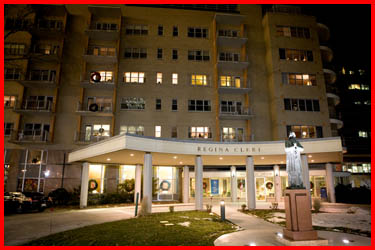
The outside of Regina Cleri
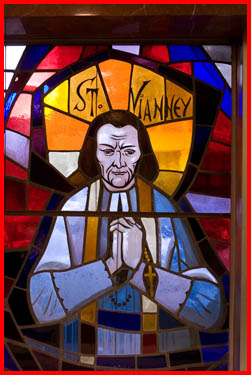
A stained glass window of the chapel where we celebrated Mass. St. John Vianney is the patron saint of priests
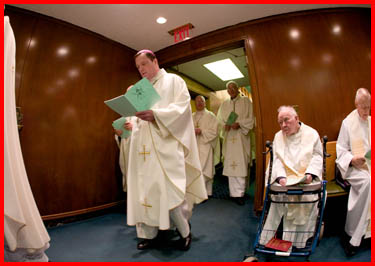
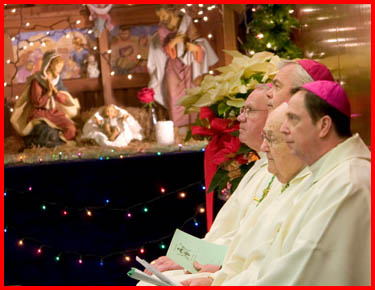
Bishops Edyvean, Dooher, Boles and Hennessey were able to join us for the Mass
The auxiliary bishops, vicar general and some of the priest in ministerial and priestly services always make an effort join us for the Mass which is celebrated around Christmastime.
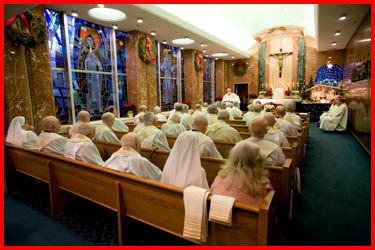
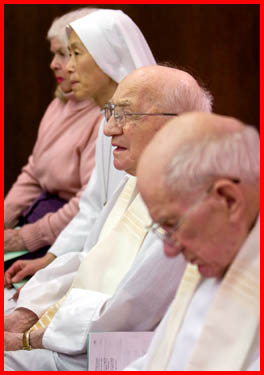
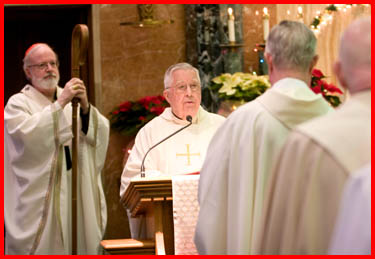
Msgr. Jim Tierney, Director of Regina Cleri proclaims the Gospel
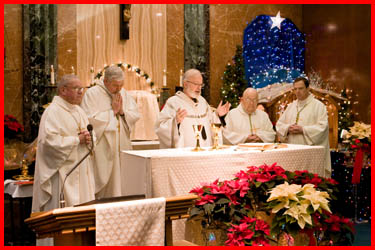
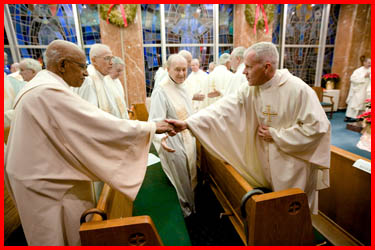
Our Vicar General, Father Richard Erikson, exchanges a sign of peace with one of the residents
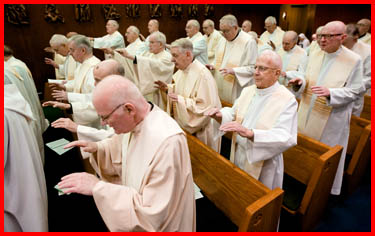
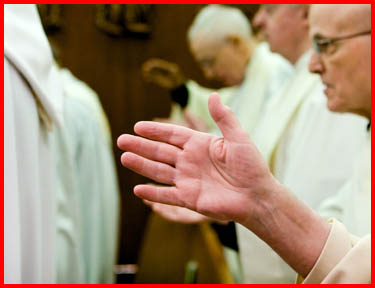
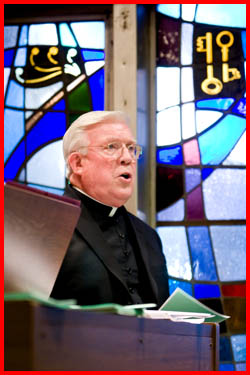
As in past years, Msgr. Frank Strahan shared his great talent by leading the singing at the Mass
This year, the Sister Disciples of the Divine Master had decorated the chapel so beautifully — the crèche and the altar. I told them that every year the chapel seems to be decorated more splendidly.
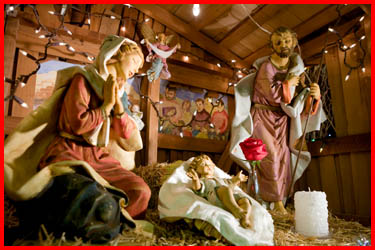
Following the Mass I had an opportunity to greet and chat with some of the priests before sitting down to a very festive meal — a turkey dinner that everyone thoroughly enjoyed.
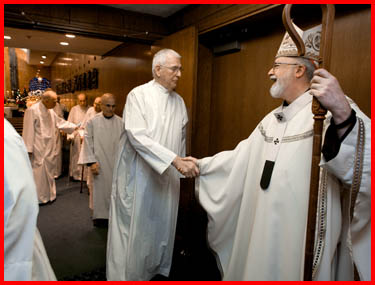
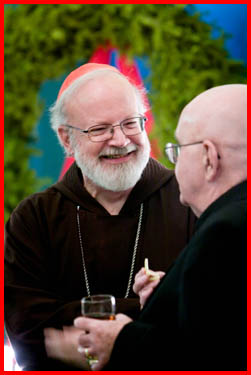
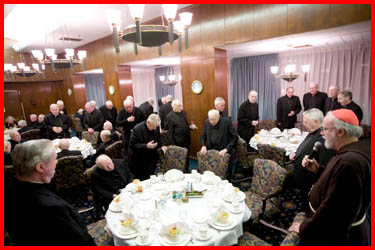
Saying grace
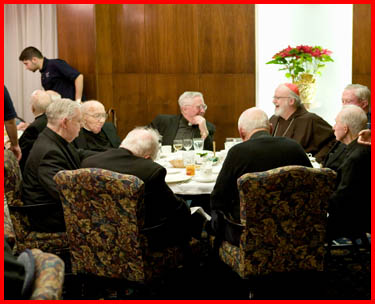
– – –
Sister Olga Yaqob has recently been on a visit to her native Iraq and has been able to visit some family and friends along with American troops. Her visit began on Dec. 16, and she is scheduled to come home sometime this month.
In the meantime, she sent us back some photos.
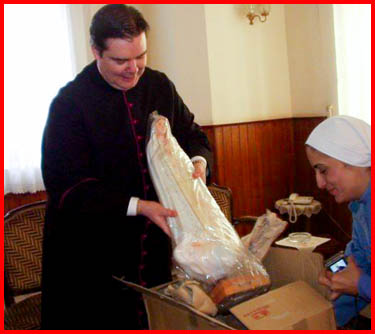
She took with her a statue of Our Lady of Fatima and presented it in the nunciature
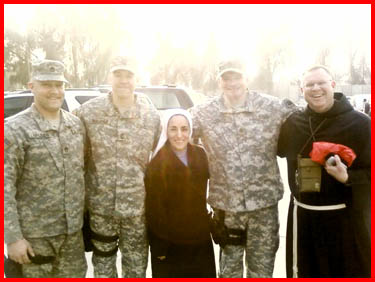
This photos shows her meeting with the chaplain, who happened to be a Franciscan, and three of the servicemen who are from Boston
We pray for sister’s safe passage and that she returns to us soon.
– – –
Finally, I’d like to take this opportunity to comment on the very encouraging advances in stem-cell research that does not involve immoral methods or the destruction of human embryos.
In light of the latest discovery employing adult skin cells, the bishops of Massachusetts issued a statement calling on the governor and our leaders in the Commonwealth to look carefully at these advances. We want to avoid putting all of our resources in methods that are immoral and have been unproductive.
We see here how faith and reason always coincide. Some people think that there is a contradiction, but as faith illumines reason, it leads us closer to the path of truth.
We hope that the statement will have some impact on the government and help educate people as to what is going on. The Church is not indifferent to the suffering of people with Parkinson’s Disease, diabetes and so many other terrible diseases. Indeed, we are anxious for cures to be discovered. However, we are convinced that whatever we do, it must respect the dignity of human life and the human person. It should never turn human life into some sort of commodity that can be used to make medicine. And if we follow moral and humane procedures, then we will find the cures that we are all longing for.
I’d like to share with you now the statement which I issued jointly with my brother bishops of Massachusetts just before Christmas:
As the Bishops of the Roman Catholic Church in Massachusetts, we applaud the recent stem cell announcements from Japan and Wisconsin. Researchers have confirmed that pluripotent stem cells can be created without need of cloning and destroying human embryos. Scientists agree that the new techniques offer real promise for finding cures.
The approach taken in the new studies avoids the moral objections associated with research requiring the destruction of human embryos. That unethical practice disregards human life and has not produced a single clinical benefit. Instead, the groundbreaking discoveries advance both science and ethics.
In light of the exciting developments in the stem cell field, we renew our call for the promotion of biotechnology in the Commonwealth that abides by the highest ethical regard for the sanctity of human life. The recent advances show that good science and respect for life can work together.
Stem cell legislation filed in the State Legislature by the Governor, similar to other bills filed by various legislators, proposes public funding to promote experiments fatal to human embryos. These experiments are performed on embryos to acquire stem cells that the new studies now demonstrate can be created through ethical means. We continue to oppose this legislation in its current form as unjust and unnecessary. We ask the Legislature to craft stem cell legislation promoting only research that respects human dignity.
Moreover, there is a rush to enact this legislation within the next few months. We urge our elected officials to conduct the legislative process at a more deliberate pace. This would accommodate full consideration of the new research findings and their bearing on the misplaced priorities currently endorsed by the Governor’s stem cell legislation and its companion bills. With so much at stake, careful assessment and not haste, is in order.
– – –
For the photo of the week, I have selected this photo from my visit Thursday to Regina Cleri. Two days before the Mass, I had been at Regina Cleri for the wake of Msgr. William Granville. One of the roses from monsignor’s funeral arrangements had been placed next to the Christ Child in the crèche at the side of the chapel for the Mass.
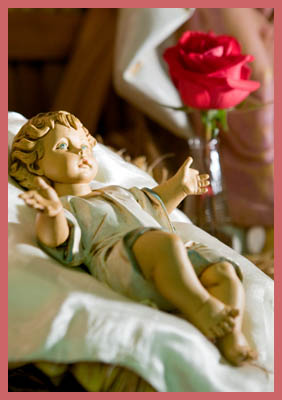
Until next week, blessings to you all,
– Cardinal Seán
